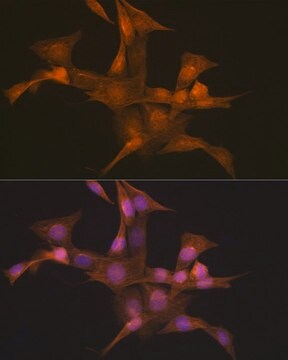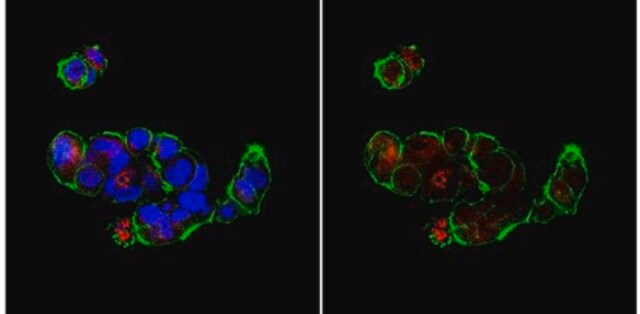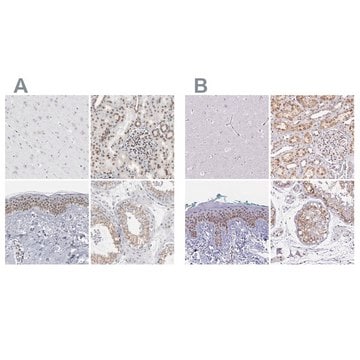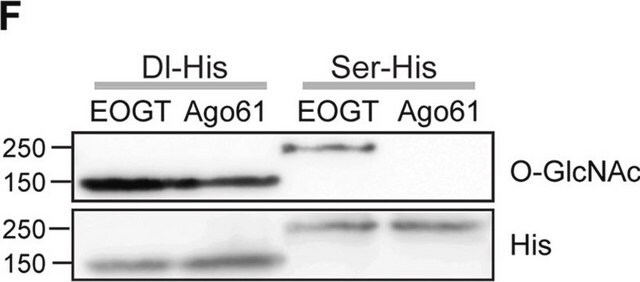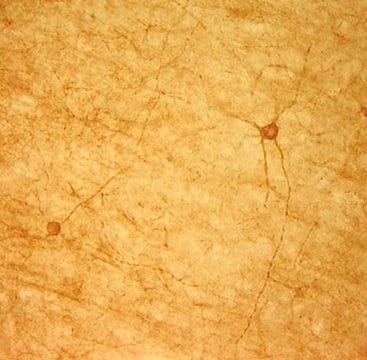MABT843
Anti-SYNE1 Antibody, clone 7A12 (MANNES1A)
clone 7A12, from mouse
Synonyme(s) :
Nesprin-1, Enaptin, Myne-1, Myocyte nuclear envelope protein 1, Nuclear envelope spectrin repeat protein 1, Synaptic nuclear envelope protein 1, Syne-1
About This Item
Produits recommandés
Source biologique
mouse
Niveau de qualité
Forme d'anticorps
purified immunoglobulin
Type de produit anticorps
primary antibodies
Clone
7A12, monoclonal
Espèces réactives
rat, human, mouse, rabbit
Technique(s)
immunocytochemistry: suitable
western blot: suitable
Isotype
IgG1κ
Numéro d'accès NCBI
Numéro d'accès UniProt
Conditions d'expédition
ambient
Modification post-traductionnelle de la cible
unmodified
Informations sur le gène
human ... SYNE1(23345)
Description générale
Spécificité
Immunogène
Application
Cell Structure
Immunocytochemistry Analysis: A representative lot immunostained the nucleus of acetone/methanol-fixed rat aortic vascular smooth muscle cells (VSMCs) by fluorescent immunocytochemistry (Duong, N.T., et al. (2014). PLoS One. 9(4):e94380).
Immunocytochemistry Analysis: A representative lot detected SYNE1 immunoreactivity predominantly in the nucleus by fluorescent immunocytochemistry staining of acetone/methanol-fixed human skin fibroblasts regardless of their emerin expression. SYNE1 immunoreactivity was redistributed to ER in the absence of lamin A/C in Lamn-/- mouse embryonic fibroblasts (MEFs) (Randles, K.N., et al. (2010). Dev. Dyn. 239(3):998-1009).
Immunocytochemistry Analysis: A representative lot immunostained multinucleate myotube nuclear envelopes, while only very weak or little SYNE1 immunoreactivity was seen among mononucleated myoblasts in myoblast cultures undergoing differentiation (Randles, K.N., et al. (2010). Dev. Dyn. 239(3):998-1009).
Western Blotting Analysis: A representative lot detected multiple SYNE1 spliced isoforms (including Giant/Enaptin, Beta, and Alpha) in human muscle tissue, skeletal muscle cells and dermal fibroblasts, as well as in Lmna-/- mouse embryonic fibroblasts (MEFs) (Randles, K.N., et al. (2010). Dev. Dyn. 239(3):998-1009).
Qualité
Isotyping Analysis: The identity of this monoclonal antibody is confirmed by isotyping test to be mouse IgG1 .
Description de la cible
Forme physique
Stockage et stabilité
Autres remarques
Clause de non-responsabilité
Vous ne trouvez pas le bon produit ?
Essayez notre Outil de sélection de produits.
Code de la classe de stockage
12 - Non Combustible Liquids
Classe de danger pour l'eau (WGK)
WGK 1
Point d'éclair (°F)
Not applicable
Point d'éclair (°C)
Not applicable
Certificats d'analyse (COA)
Recherchez un Certificats d'analyse (COA) en saisissant le numéro de lot du produit. Les numéros de lot figurent sur l'étiquette du produit après les mots "Lot" ou "Batch".
Déjà en possession de ce produit ?
Retrouvez la documentation relative aux produits que vous avez récemment achetés dans la Bibliothèque de documents.
Notre équipe de scientifiques dispose d'une expérience dans tous les secteurs de la recherche, notamment en sciences de la vie, science des matériaux, synthèse chimique, chromatographie, analyse et dans de nombreux autres domaines..
Contacter notre Service technique